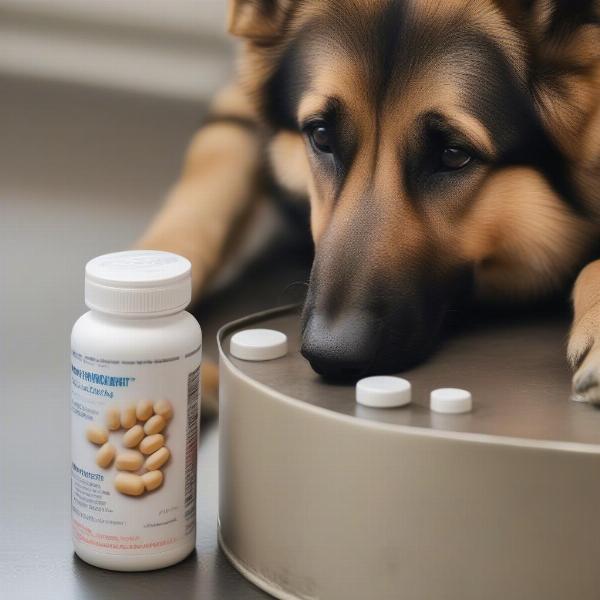Choosing the right food is crucial for a German Shepherd’s health and well-being. With so many options on the market, finding the best dog food for your German Shepherd can be overwhelming. This comprehensive guide will explore the nutritional needs of this breed and help you make an informed decision, ensuring your furry companion thrives.
Understanding Your German Shepherd’s Nutritional Needs
German Shepherds are active, intelligent dogs prone to certain health issues like hip and elbow dysplasia and digestive sensitivities. Their diet should support their energetic lifestyle and address these potential concerns. Key nutrients to look for include high-quality protein for muscle development and maintenance, healthy fats for energy and skin health, and controlled calcium and phosphorus levels for proper bone growth, particularly in puppies. Avoiding fillers, artificial colors, and flavors is also essential for optimal digestion.
What to Look for in the Best Dog Food for German Shepherds
When choosing the best dog food for your German Shepherd, look for a formula specifically designed for large, active breeds. Check the ingredient list for high-quality animal protein sources like chicken, lamb, beef, or fish as the primary ingredients. The food should also contain moderate levels of healthy fats, like omega-3 and omega-6 fatty acids, for skin and coat health. Avoid foods with excessive fillers like corn, wheat, and soy, as these can contribute to digestive issues.
Life Stage Considerations: Puppy, Adult, and Senior
A German Shepherd’s nutritional needs change throughout its life. Puppies require higher protein and calorie content to support rapid growth, while adult dogs need a balanced diet to maintain muscle mass and energy levels. Senior German Shepherds often benefit from a formula lower in calories and fat to prevent weight gain and support joint health.
Best Dog Food Types for German Shepherds
Several types of dog food are available, including dry kibble, wet food, and raw diets. Dry kibble is the most common and convenient option, offering a complete and balanced diet in an easy-to-store format. Wet food can be more palatable for picky eaters and provides extra hydration. Raw diets require careful preparation and monitoring to ensure nutritional balance. alsatian guard dog
Addressing Common Health Concerns with Diet
German Shepherds are prone to certain health conditions, including hip and elbow dysplasia and digestive problems. Choosing a food with glucosamine and chondroitin can support joint health. For dogs with sensitive stomachs, look for a formula with easily digestible ingredients and prebiotics or probiotics to promote gut health.
 German Shepherd dog with joint supplements
German Shepherd dog with joint supplements
What if My German Shepherd is a Picky Eater?
Some German Shepherds can be picky eaters. If your dog refuses to eat its food, try switching to a different flavor or texture. You can also try adding warm water or a small amount of plain cooked chicken or beef to make the food more appealing. german shepherd dogs for sale in nj
Conclusion
Providing your German Shepherd with the best dog food is an investment in their long-term health and happiness. By understanding their specific nutritional needs and choosing a high-quality, balanced diet, you can help them live a long, active, and fulfilling life. Remember to consult your veterinarian for personalized recommendations based on your dog’s individual needs.
FAQ
-
What is the best dog food for a German Shepherd puppy? A high-quality puppy food formulated for large breeds, rich in protein and calcium, is ideal.
-
What should I feed my senior German Shepherd? A senior formula with lower calories and fat, but with added joint support, is recommended.
-
Can I feed my German Shepherd a raw diet? Raw diets can be complex and require careful planning to ensure nutritional balance. Consult your vet before switching to a raw diet.
-
My German Shepherd has a sensitive stomach. What should I feed him? Look for a food with easily digestible ingredients, prebiotics, and probiotics.
-
How much food should I feed my German Shepherd? Follow the feeding guidelines on the dog food packaging and adjust based on your dog’s age, activity level, and weight.
-
What are the signs of a food allergy in a German Shepherd? Skin irritation, itching, digestive upset, and ear infections can be signs of a food allergy.
-
How often should I feed my German Shepherd? Most adult German Shepherds do well with two meals a day.
Looking for more helpful tips for your canine companion? Check out these related articles:
ILM Dog is a leading international website dedicated to providing expert advice on dog care and breeding. We offer valuable resources on dog breeds, health, training, nutrition, grooming, and much more. From choosing the right breed to ensuring optimal health and well-being, ILM Dog is your one-stop resource for all things dog-related. Connect with us today for expert guidance and support. Email: [email protected], Phone: +44 20-3965-8624.